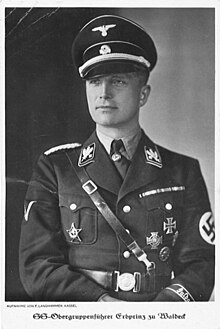Josias, Hereditary Prince of Waldeck and Pyrmont
| Josias Erbprinz zu Waldeck und Pyrmont | |
|---|---|
 |
|
| Born |
13 May 1896 Arolsen, German Empire |
| Died | 30 November 1967 (aged 71) Schloss Schaumburg, near Diez an der Lahn, West Germany |
| Allegiance |
|
| Years of service | 1914–1945 |
| Rank | Obergruppenführer |
| Commands held | HSSPF Fulda-Werra SS-Oberabschnitt Fulda-Werra |
| Battles/wars |
World War I World War II |
| Awards | Eisernes Kreuz I |
| Prince Josias | |
|---|---|
| Hereditary Prince of Waldeck and Pyrmont | |
| Head of House of Waldeck and Pyrmont | |
| Tenure | 26 May 1946 – 30 November 1967 |
| Predecessor | Friedrich |
| Successor | Wittekind |
| Spouse | Duchess Altburg of Oldenburg |
| Issue | Margarethe, Countess of Erbach-Erbach Alexandra, Princess Botho of Bentheim and Steinfurt Princess Ingrid Wittekind, Prince of Waldeck and Pyrmont Guda, Princess of Wied |
| House | Waldeck and Pyrmont |
| Father | Friedrich, Prince of Waldeck and Pyrmont |
| Mother | Princess Bathildis of Schaumburg-Lippe |
Josias, Hereditary Prince of Waldeck and Pyrmont (German: Josias Georg Wilhelm Adolf Erbprinz zu Waldeck und Pyrmont) (13 May 1896 – 30 November 1967) was the heir apparent to the throne of the Principality of Waldeck and Pyrmont and a general in the SS. From 1946 until his death, he was the head of the Princely House of Waldeck and Pyrmont. After World War II, he was sentenced to life in prison at the Buchenwald Trial (later commuted to 20 years) for his part in the "common plan" to violate the Laws and Usages of War in connection with prisoners of war held at Buchenwald concentration camp, but was released after serving about three years in prison.
He was born in Arolsen at the ruling family's castle, the eldest son and heir of Prince Friedrich of Waldeck and Pyrmont and his consort Princess Bathildis of Schaumburg-Lippe. He was the nephew of William II, King of Württemberg, and Emma of Waldeck and Pyrmont, Queen Regent of the Netherlands. He was also a cousin of Wilhelmina, Queen of the Netherlands, and Charles Edward, Duke of Saxe-Coburg and Gotha. He enlisted in the German Army as a cadet and fought in the First World War, where he suffered serious injuries. At the end of the war, his family lost their Principality as Waldeck and Pyrmont became a Free State in the new Weimar Republic.
...
Wikipedia
